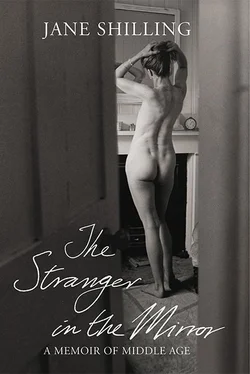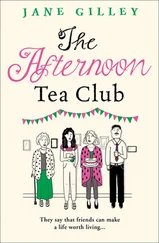Looking back at the pictures of myself as a child, writhing nervously in front of the lens, legs and arms twisted together like bindweed, unable to meet the camera’s gaze, it strikes me that the source of my daily playground jolt of irritation, the thing for which I found it hard to forgive my son, was that he resembled me as a child.
Long before I gave birth to him, from early childhood onwards, I had been weaving an elaborate fantasy of the sort of children I would have in the future, the sort of mother I would be. I wanted to be the mother of sons – of that I was certain. Lots of sons – six, perhaps – and no daughters. Or perhaps just one, late girl after I’d reared my brood of fantasy boys.
I had grown up in a household of flustered female meekness. ‘Efface yourself!’ my father used to demand. Victorian children were allowed to be seen, if not heard. But he apparently wished his daughter to vanish altogether. I tried to do as I was told – at least, I suppose that’s what I’m doing in the photographs with the contorted posture and scrunched-up arms and legs – trying to make myself as small and invisible as possible; trying to efface myself.
My negligible worth as a daughter convinced me that I didn’t want anything to do with girls when it was my turn to be a parent. Like Louisa May Alcott’s Jo March in her adult incarnation, when I grew up I wanted a kind-but-firm husband with scholarly leanings, and a shabby-but-comfortable house filled with cheerful, manly, rough-and-tumble little boys, forever getting into wholesome mischief. How I thought I might achieve this fantasy, given the striking absence of cheerful rough-and-tumble in our family, which was more inclined to grim silences, compressed lips, speaking glances and raised voices behind closed doors, I have no idea. But it was an intensely persuasive vision.
Even now that it is relinquished I find myself still dreaming sometimes that it really happened; and that my present reality was an uneasy trance from which I have now woken: I see the shape of the house as though I’d lived there all my life – old bricks, a tiled roof, ancient yew and apple trees; a paddock edged with sloe and hazel rising away from the house towards woods and orchards and at the far horizon the glitter of the sea.
From the woods and the paddock I hear the distant shouts of children faintly rising (I’m always in the kitchen in this dream, cooking something. A tendency to wild over-catering, as though feeding the vast family I never had, has been a constant feature of my grown-up life). I sense, rather than see the shapes of croak-voiced adolescents slumped on the living-room floor and sofas, absorbed in some electronic game; feel the shadowy heft of a smaller child at my hip (they never have faces, these dream children, only the vague lineaments – the long limbs and tangle of dirty blond hair – of my real son).
The experience of being pregnant silenced conclusively the bravado of theoretical preferences. I didn’t even think about what sort of baby I might be having, so stupefied was I by the fact that I was having one at all (and so startled by the astonishing, Scutari filth and brutality of the obstetric care at the south London teaching hospital where I was a patient).
I turned up for my 20-week scan untroubled, for the first time since childhood, by the urgent longing for a son (but surprised and rather impressed by my own uncharacteristic blitheness). Boy, girl, whatever, said I to myself as I climbed on to the sonographer’s couch. As long as it’s got arms and legs and fingers and toes. And a head.
‘Would you like to know baby’s sex, as such?’ asked the sonar operator. As such, I thought I would, even while glorying in my virtuous indifference to the information. ‘This,’ said the sonographer, flirting a white arrow somewhere around the mid-section of the pulsating mass on the monitor that represented my developing child, ‘is the willy area.’
The willy area? A boy, then? I was to be the mother of a son? I had studied Coriolanus for A level, and in an instant felt myself morphing into the terrible Roman matriarch, Volumnia, whose great glory is that she is her son’s mother. Expecting a boy, eh? Well, get me !
My fantasy of myself as the mother of a son was so vivid that I didn’t suffer a moment’s anxiety about how I was going to do it. I knew nothing about the raising of boys; and not much about males in general. My only successful relationship with a man had been with my grandfather, who died when I was 18. It wasn’t much of a base from which to undertake, single-handed, the nurture of an infant son.
And yet I was superbly sure I could do it. My child-rearing theory was simple: I would do the opposite of everything in my upbringing, and the result would be the cheerful, open, uncomplicated child of my imagining. Genetics, in the limited form in which I studied the subject at school, had concentrated on the inherited characteristics of pea shoots. I had read more than enough biography and fiction to understand that people, like peas, pass on traits down the generations, but still I failed to make the connection between peas and me.
No one forced me to be a single mother. I could have refused the role, but I chose not to. Strange, then, that I found it so hard to reconcile myself to my situation. My surreally conventional suburban background had suited me very poorly; yet when it came to inventing myself as a parent, I found I missed it. I couldn’t think myself into the role of the cool young babymother, out to parties every night with the infant slumbering sweetly in a wicker basket among the abandoned coats; nor that of the well organised career woman, expertly juggling work and baby. I wanted very much to be a married lady with a ring on her finger, a white wedding dress in the closet, honeymoon photographs on the sideboard and lamb chops in the fridge for supper.
I went to work every day, came home, retrieved the baby from my next-door neighbours, who looked after him as kindly as though they were family – which in effect they were – and went home to cook lamb chops for one. By degrees I began to inhabit an atmosphere almost as permeated with powerlessness and rage as the one in which I had grown up.
Then Linda arrived. Most people can look back over a life and see in it a pattern of encounters – a couple, a handful – by which the course of their existence was shifted from one trajectory to another. Linda arrived at a moment of dire catastrophe when my son was 20 months old. I had, that morning, gone mad from a combination of chronic lack of sleep, a difficult house move and an intractable sense of loss, and was due to keep an appointment with a psychiatrist at the Maudsley Hospital, round the corner from my flat.
If my prospective nanny thought the set-up unusual – the gloomy basement flat, the absence of a father, the haggard and dishevelled mother, the strangely silent child, the hovering pair of concerned friends (there to make sure I didn’t do myself a mischief on the way to the Maudsley) – she didn’t say so, but agreed to take the job, with a start date a few weeks hence, by which time I was planning to have recovered my sanity and accomplished the move from my flat in Peckham to a cottage in Greenwich.
Linda was an unusually composed 19-year-old with a milkmaid’s pink-and-white complexion and an air of implacable calm. Unlike Mary Poppins, who was always cross, and whose presence drove inanimate objects to jiggle in nervous frenzy – drawers slamming themselves open and shut; toys and books leaping to attention – she had a curious ability to impose stillness on her surroundings. She came, like Peggotty, from Great Yarmouth.
She took a dim view of the fact that Alexander, at almost two, scarcely spoke and of his quirk of referring to himself, on the rare occasions when he did utter, in the second person: ‘You need a drink. You want to go home now…’ In a matter of weeks, apparently without effort on her part or resistance on my son’s, she had him potty trained, drinking from a cup rather than a mug with a spout, using a knife and fork and conversing volubly in conventional syntax. The hectic gloom in which we had been existing was replaced by a peaceful ordinariness so unaccustomed as to seem utterly exotic.
Читать дальше












